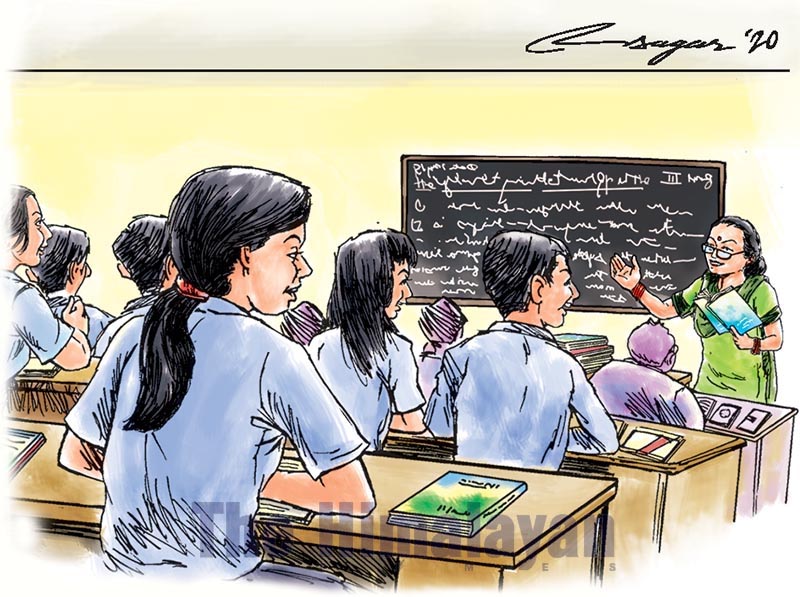New high school curricula change: They don’t add up
As it stands today, the educational curricula and delivery of school level mathematics in Nepal leave a lot to be desired. Both the numeracy skills and the grades of our students speak volumes of the current state of affairs. This should prompt us to improve mathematics education in the country
As the much-touted adage goes, child is the father of man. How we nurture our children today will have implications on the entire society in the future.
Therefore, it is incumbent upon us to ensure that our cadres are prepared for the challenges of the future as their success and failures will reflect on our foresightedness.
Modern means of transport and communications have turned the global village into a highly competitive and rapidly evolving market. In this scenario, the importance of a robust educational foundation becomes incredibly important.
Mathematics ‘remains an inalienable part of modern-day sciences, with its applications expanding to fields ranging from economics to epidemiology’.
Mathematics has been instrumental in uncovering physical reality’s nature, allowing quantitative empirical measurement of the physical quantities and formulating relationships between them and accordingly make precise predictions Mathematics has been described as the ‘queen of sciences’ by noted German physicist and mathematician Carl Friedrich Gauss, while prominent Italian physicist and mathematician Galileo Galilee described mathematics as “the language in which God has written the universe”.
Therefore, a good grasp of mathematics is indispensable in understanding and studying the sciences that drive today’s innovations.
Frankly speaking, a child uses his intellect independently, most probably the first time he attempts to seek possible ways of solving mathematical problems. And as Albert Einstein noted, ‘Education is not the learning of facts, but the mind’s training to think’.
Therefore, it is of great sadness that the Ministry of Education and the Curriculum Development Centre has proposed a curriculum for grades 11 and 12 intending to overburden the students with six subjects of which three are imposed as compulsory. Moreover, mathematics has been excluded as one of the subjects available to all the students of grade 11. This undermines the relationships that the physical or chemical sciences bear with mathematics.
The designers of the curriculum (so-called experts) would benefit by perusing Einstein’s essay “On the method of theoretical physics”, where he has emphasised that science must begin and end with the experience of the world but that ‘the creative principles reside in mathematics’ and try to understand why the famous Swiss scientist Paul Dirac called ‘God a mathematician’.
So, expecting a student to be right in physics and chemistry (exceedingly physical chemistry) without mathematics is similar to expecting a good writer without good vocabulary and grammar or expecting an effectively working computer without a sound working CPU. We all know that even a medical doctor diagnoses a disease based on lab reports or tests that require mathematical tools, especially statistical analyses of the patient’s data. This accounts for why biomathematics is an emerging subject.
While proving a theorem or seeking a solution to a mathematics problem, one should abide by the rules or mathematical disciplines based on definitions, axioms or postulates. These rules have been tested rationally and are found to be valid upon practical implementation while solving real-world problems. Any deviation from the rules leads us nowhere but towards a fallacious result.
It, in other words, means that in due course of proceeding from the initial point or the beginning of providing proof or a solution towards the final end of completion, one should first clearly understand the nature of the problem, identification of the available tools and their proper usage in sequential order.
In this process, they should enjoy independent intellectual ability, or mental exercise should be within the guided framework. Thus mathematics provides an effective way of building mental discipline and encourages logical reasoning and cognitive rigour.
The scenario in the real world is analogous. We being social animals are bounded by the pre-established social rules and laws.
The solution to daily life or other real-world problems should be within the guided framework. Individuals with mathematical aptitude are thus likely to be ahead of others in this context.
Liking mathematics is associated with more positive factors like innate interest and curiosity for the subject, positive expectations, higher self-efficacy and personal values towards maths.
In contrast, dislike for mathematics is associated with boredom, low self-efficacy, fear and negative experiences.
Thus, mathematics can be the best alternative to social studies or life skill education. The high school years are a significant milestone in any student’s life. A SEE graduate teenager should be accorded choices to pursue a wide range of career options with adequate support and counseling and be able to select any stream based on their merit. We are at risk of curtailing an individual’s potential and creativity by narrowing the options available to them to pursue.
As it stands today, the educational curricula and delivery of school level mathematics in Nepal leave a lot to be desired. Both the numeracy skills and the grades of our students speak volumes of the current state of affairs. This should prompt us to improve mathematics education in the country and not bury our heads in the sands and do away with the subject itself because ‘facts do not cease to exist because we have chosen to ignore them’.
The proposed curricula will force a large number of students to flee abroad or choose foreign school courses, which eventually hurts our nation’s socio-economic condition. It will decrease our students’ global competency and promote rote learning rather than conceptual understanding.
In this context, every academician and well-wisher of the nation should show deep concern over the impacts on our nation’s future. Let our child not say, “I was born intelligent, but education ruined me.”
Sharma is president, Nepal Mathematical Society






